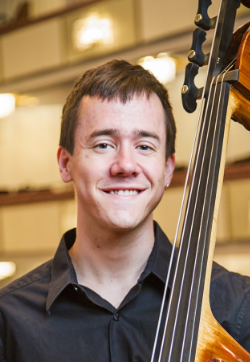
Photo credit: Scott Suchman
The National Symphony Orchestra performed live on National Public Radio’s All Things Considered broadcast on February 27, 2017. At noon that day the NSO piled into Studio 1 at the NPR headquarters in Washington, DC, and at 12:30 began rehearsing snippets of twelve or so popular pieces from the orchestral repertoire. Save for a few arrangements of the NPR theme music procured especially for the occasion, all repertoire was taken from the public domain. The broadcast was covered under the terms of the AFM National Public Radio Agreement.
The repertoire was selected so as to correspond to the stories that followed in the broadcast that day. For example, the thorny second movement of Shostakovich’s 10th Symphony followed a story on anti-Semitism, Chabrier’s light-hearted España followed a story on how to mitigate your carbon footprint, and the “Infernal Dance” from Stravinsky’s Firebird followed a story on Steven Sondheim’s gruesome musical Sweeney Todd.
Our performance call was technically at 3:50 p.m., ten minutes ahead of the show’s start time, to make sure the orchestra was ready to go exactly at 4:00, and in case a last minute program change came through (one did). We were reminded very kindly to observe break times diligently so we would be ready to go when necessary—everything was broadcast live and we only had one chance.
While we weren’t performing, All Things Considered was piped into the studio so we could all listen along. Then, 30 seconds before a news story was wrapping up, the feed to the studio would be cut, and we would all know it was almost time to play the next selection. Our Principal Pops Conductor Steven Reinecke would then wait for a split-second visual cue from the NPR staff to start exactly on time. The feeling of constantly wondering exactly when we were going to start playing next was an unusual experience for the group.
The NSO’s first contribution to the show were energetic arrangements of the famous All Things Considered theme, affectionately referred to as “Trixie” amongst NPR employees. During the broadcast, we played a short version and a long version of the theme arranged for full orchestra by Reineke. Sometime in the first hour, the NSO bass section rocked a version of “Trixie” that I was lucky enough to get to write.
A very interesting fact about the All Things Considered theme, composed in 1974 by Don Voegeli (1920-2009), is that it bears remarkable resemblance to the first movement theme of Louise Farrenc’s (1804-75) Piano Quintet #2. You can now access Farrenc’s quintet on imslp.org, but in 1974, Voegeli had no way of accessing that particular score short of scouring antique music shops, since the piece had been out of print since 1895 and the internet didn’t exist yet. The degree of difference between Voegeli’s All Things Considered theme and Farrenc’s first movement theme, it should be noted, is about the same as that between David Bowie’s “Under Pressure” and Vanilla Ice’s “Ice Ice Baby.”
Monica Estatieva, an employee at NPR, first hatched the original idea for the collaboration between NPR and NSO more than two years ago, but her dream seemed too complicated to be put into motion—until she returned from a difficult assignment in Afghanistan and was determined to make the project happen. It seems natural, at least superficially, that the National Symphony Orchestra ought to work with National Public Radio, but only weeks ago was the partnership realized for the first time. Both the orchestra and the staff at NPR were very excited about the opportunity. I echo Ari Shapiro’s on-air kudos to Monica for dreaming up this excellent experience.
It was certainly odd to not be able to see our audience throughout the show, but the pressure to play our best was, if anything, increased compared to a regular performance. An estimated 13 million people usually tune in to hear NPR broadcasts, and the orchestra felt taut and ready to spring the instant our conductor gave the sign. Another upside of this unusual situation was the absence of that obnoxious coughing that seems to inevitably occur at inappropriate times if human beings assemble above a certain number.
At the end of the show, All Things Considered host Audie Cornish conducted a brief interview with NSO trombonist David Murray and maestro Reinecke, which was then followed by the overture to Mozart’s Marriage of Figaro to finish the broadcast.





